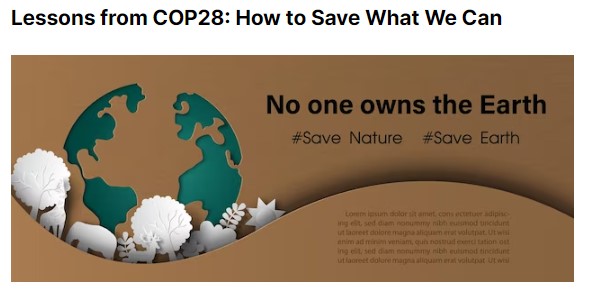Lessons from COP28: How to Save What We Can
## Introduction
The 28th Conference of Parties (COP28) held in Dubai shed light on the urgent need to reduce carbon emissions and mitigate global temperature increase. The United Nations Environment Programme (UNEP) released its 14th Emissions Gap Report, highlighting the disparity between planned mitigation measures and the actions required to limit temperature rise to 1.5 degrees Celsius by 2100. In this article, we will explore the key lessons from COP28 and discuss the necessary steps to combat climate change.
Understanding the Emissions Gap
The Emissions Gap Report measures the difference between the projected global emissions and the level required to avoid climate shocks. It emphasizes the need to reduce greenhouse gas (GHG) emissions to limit the temperature rise. GHGs, including carbon dioxide (CO2), methane, nitrous oxide, and synthetic gases, contribute to global warming. CO2, primarily generated through burning fossil fuels, has a long-lasting impact on the environment. The transport, manufacturing, construction, and power generation sectors are major contributors to CO2 emissions.
The Correlation Between GHGs and Global Warming
The average global temperature has been steadily rising due to the increased concentration of GHGs in the atmosphere. These gases originate from various sources, including energy-related activities, industry, agriculture, land use, and waste. The Earth's mean temperature has already increased by approximately 1 degree Celsius compared to pre-industrial levels. GHGs trap heat in the atmosphere, leading to a rise in temperature. This phenomenon results in extreme weather events such as heavy rainfall, floods, droughts, storms, and cyclones.
Mitigation Plans for a Sustainable Future
To combat climate change, it is crucial to transition to sustainable practices in various sectors. Here are some key strategies discussed at COP28:
Transition in Power Generation
Shifting away from fossil fuels in power generation is essential. Renewable energy sources like solar and wind energy play a significant role in this transition. Investing in renewable energy infrastructure and incentivizing clean energy adoption can accelerate the shift towards sustainable power generation.
Transformation in Transportation
A shift towards electric and hydrogen-based vehicles can help reduce dependence on traditional fossil fuels. Governments and industries should prioritize the development of charging infrastructure and promote the adoption of clean transportation solutions.
Addressing Industrial Sector Challenges
The industrial sector poses unique challenges in transitioning away from fossil fuels. Industries with high-intensity heat requirements, such as iron and steel and aluminum, face limitations in adopting renewable energy sources. Finding alternative solutions and investing in research and development can help overcome these challenges and reduce carbon emissions in the industrial sector.
Climate Financing Mechanism Based on Historical Responsibility
Transitioning to clean energy and sustainable practices requires significant financial resources. Developed countries, responsible for the majority of historical carbon emissions, should provide financial assistance and technology transfer to developing nations. Following the principle of "polluter pays," countries with higher cumulative emissions should bear a greater responsibility for funding climate mitigation and adaptation efforts.
Progress of COP28 Climate Meeting
Fossil Fuels' Entry at COP28
COP28 marked a significant shift in climate negotiations, with a focus on addressing fossil fuels. The global community's insufficient progress towards achieving climate targets heightened the pressure to address the role of fossil fuels. Sultan Al Jaber invited countries to submit proposals for the phase-out of fossil fuels, indicating a willingness to confront this issue after decades of omission.
Global Stocktake Report
One of the contentious issues at COP28 was the global stocktake report. This report holds the key to determining climate change policies, including climate equity and phasing out fossil fuels. While no decision has been reached yet, discussions surrounding this report are crucial for charting the way forward in the fight against climate change.
Positive Developments on the Loss and Damage Fund
There has been some positive movement concerning the establishment of a loss and damage fund. This fund aims to provide financial support to vulnerable countries affected by climate change impacts. While progress has been made, more efforts are needed to ensure adequate support for those facing the consequences of climate change.
Moving Beyond Statistical Jugglery on Climate Financing
Efforts to transfer resources to developing countries for climate mitigation and adaptation have fallen short of expectations. While discussions of transferring $100 billion per year have taken place, the actual amount transferred is much lower. OECD data may indicate transfers of approximately $80 billion per year, but this figure fails to address the full funding requirements. Countries need to move beyond statistical jugglery and take concrete actions to provide adequate financial support for climate initiatives.
The Urgency for Additional Actions
Despite countries' nationally determined contributions (NDCs) to combat climate change, the latest emissions gap report indicates that temperature rise projections are still alarmingly high. The UNEP report suggests a potential temperature increase between 2.5 and 2.9 degrees Celsius by the end of the century, far exceeding the desired limit. It is evident that more needs to be done to reduce emissions and mitigate the impacts of climate change.
Conclusion: A Collective Fight for a Sustainable Future
Climate change is a global issue that affects all countries, requiring a collective effort to combat its consequences. Developing countries, which have limited means to address climate change, must receive support from wealthier nations. While some progress has been made, there is still a long way to go in containing rising temperatures and ensuring a sustainable future. COP28 serves as a reminder of the urgent actions needed to save our planet and protect future generations from the devastating impacts of climate change

.jpg)


Comments
Post a Comment